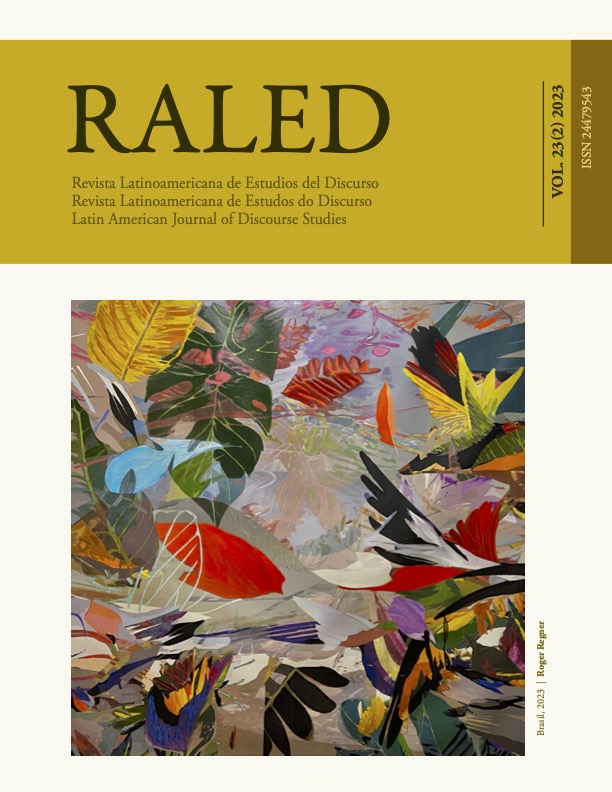Continued Formation in Sexual Diversity and the possibilities that emanate from Intersectionality allied to Critical Discourse Studies
DOI:
https://doi.org/10.35956/v.2.n23.2023.p.147-166Keywords:
Continued Formation, Critical Discourse Studies, Intersectionality, Sexual Diversity, Social ChangeAbstract
This paper addresses the analytical possibilities between Intersectionality and Critical Discourse Studies towards the narratives of 3 public education professionals from D.C. who participated in “Recognizing Sexual Diversity at School” in 2022. As part of the activities, it was necessary to participate in forums which brought up discussions on self-identification and identity crossroads. These texts presented perceptions about social inequality which affected the participants, as well as their students. Thus, through the posted texts and semi-structured interviews, I aim at analyzing their narratives to comprehend how simultaneous oppressions impact determined bodies at school. Moreover, these texts’ discursive materiality indicates the participants’ critical reflexivity process which can propose provocative actions towards social change where they work. Methodologically, this study is qualitative and interpretative, since it is possible to observe how people articulate, how their experiences come alive and become meaningful, expressing the social relations in a freer way.
Downloads
References
AKOTIRENE, C. 2019. Interseccionalidade. São Paulo: Pólen.
BUTLER, J. 2017. Problemas de gênero: feminismo e subversão da identidade. Tradução de Renato Aguiar. 15ª ed – Rio de Janeiro: Civilização Brasileira.
BUTLER, J. 2022. Desfazendo o gênero. Coordenação da tradução por Carla Rodrigues – São Paulo: Editora Unesp.
BARROS, S. M. 2016. Análise Crítica do Discurso, Gramática Sistêmico-Funcional e Realismo Crítico: Abordagens Interdisciplinares. In: Revista ECOS [S.l.] 9, 2: 241-254.
CAFÉ, L. da C. M. 2020. A gente só é; e pronto: uma análise linguístico-discursiva sobre os impactos da LGBTIFOBIA na escola. Curitiba: Appris.
CAFÉ, L. da C. M. 2021. AGÊNCIA, REFLEXIVIDADE CRÍTICA E LGBTIFOBIA NA ESCOLA: a potência das ações educativas antineoliberais. In: Revista Querubim, Rio de Janeiro-RJ, 17: 50-58.
CAFÉ, L. da C. M. 2023. Interseccionalidade e os discursos sobre raça, gênero e diversidade sexual na escola. In: Brazilian Journal of Development, [S.l.] 9, 1: 4866–4885.
CHOULIARAKI, L; FAIRCLOUGH, N. 1999. Discourse in Late Modernity. Edinburgh: Edinburgh University Press.
COSTA, V. H. C. 2015. Os processos mentais nas representações de homens e mulheres heterossexuais em anúncios pessoais eletrônicos. In: Letras, Santa Maria, 25, 50: 119-142.
CRENSHAW, K. 2004. Intersecionalidade na Discriminação de Raça e Gênero.
Cruzamento: raça e gênero. Brasília: Unifem [S.l.]: 7-16.
DISTRITO FEDERAL. 2014. Diretrizes de Formação Continuada da Secretaria de Estado de Educação do Distrito Federal. Brasília: EAPE.
FAIRCLOUGH, N. 2003. Analyzing Discourse: textual analysis for social research.
London: Routledge.
FAIRCLOUGH, N. 2016. Discurso e mudança social. Brasília: Editora Universidade de Brasília.
KILOMBA, G. 2019. Memórias da Plantação. Episódios de racismo quotidiano. Portugal. Ed. Orfeu Negro.
LOURO, G. L. 2014. Gênero, sexualidade e educação: uma perspectiva pós-estruturalista. Petrópolis: Vozes.
MACEDO, A. C. 2023. Sobre Interseccionalidade. Brasília: Filos.
MAGALHÃES, I; MARTINS, A. R; RESENDE, V. de M. 2017. Análise de discurso crítica: um método de pesquisa qualitativa. Brasília: Editora Universidade de Brasília.
MARTÍNEZ, L. F. P. 2012. A questão do poder e da ideologia na análise de discurso crítica (ADC). In: Questões sociocientíficas na prática docente: Ideologia, autonomia e formação de professores, 121-130. São Paulo: Editora UNESP.
RESENDE, V. de M; RAMALHO, V. Análise de Discurso Crítica, do Modelo Tridimensional à articulação entre práticas: implicações teórico-metodológicas. In: Linguagem em (Dis)curso – LemD 5, 1: 185-207.
RESENDE, V. de M ; RAMALHO, V. 2017. Análise do discurso crítica. São Paulo: Contexto.
RIBEIRO, D. 2019. Lugar de Fala. São Paulo: Sueli Conceição; Pólen.
SPIVAK, G. C. 2010. Pode o subalterno falar?. Tradução de Sandra Regina Goulart Almeida, Marcos Pereira Feitosa e André Pereira Feitosa. Belo Horizonte: Editora UFMG.
TAVARES, R. C. de L; RESENDE, V de M. 202. Da necessária coerência entre Ontologia, Epistemologia e Metodologia: Contribuições em estudos críticos do Discurso. In: DisSOL, Pouso Alegre - MG 6, 13: 82-95.
VIEIRA, V; RESENDE, V de M. 2016 Análise de discurso (para a) crítica: O texto como material de pesquisa. Campinas: Pontes Editores.
Downloads
Published
How to Cite
Issue
Section
License
Copyright (c) 2023 Leonardo da Cunha Mesquita Café

This work is licensed under a Creative Commons Attribution-NonCommercial-NoDerivatives 4.0 International License.
The authors retain the copyright and guarantee RALED the right to be the first publication of the work as well as a Creative Commons Attribution License that allows others to share the work with recognition of authorship and the initial publication in this journal.




